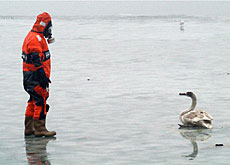
Swiss reject vaccinating poultry

As France prepares to vaccinate almost a million birds against avian flu, the Swiss government says vaccination only makes sense if the virus is rife.
EU agriculture ministers met on Monday to discuss ways to combat bird flu – which has now spread to six member countries – including a Europe-wide vaccination programme.
“In the current situation Switzerland will not vaccinate poultry,” Marcel Falk, spokesman for the Swiss Federal Veterinary Office, told swissinfo.
“In our view it would be too risky. If bird flu is introduced to our chicken population, it’s vital that it’s detected quickly.
“Vaccinated animals still get infected and pass the virus to other animals. But they don’t get sick and die, so you can’t recognise if bird flu has been introduced.”
He said vaccination made sense if the virus was widespread, as in Asia, and if it was no longer possible to eradicate it.
“At the moment Switzerland’s goal is protecting its poultry from bird flu,” added Falk.
Ban reintroduced
On Monday the Swiss government reintroduced a ban on keeping chickens outdoors to prevent contact with migratory birds from Africa that might be carrying the H5N1 virus.
Falk described this as “the most important measure to protect poultry” and said the birds would be kept cooped up “until there is a better solution”.
Christian Griot, head of the national laboratory for highly contagious animal diseases, echoed the view that rapid identification and elimination of infected birds represented the best course of action at present.
“It’s true that killing flocks of birds largely eliminates the virus from a particular spot, but it has the disadvantage that every bird ends up dead,” he told swissinfo.
Fresh cases
France – the EU’s largest poultry producer – last week became the latest EU country to report H5N1 cases, joining Austria, Germany, Greece, Italy and Slovenia.
Cases have also been confirmed recently in Bosnia, Azerbaijan, Bulgaria, Croatia, Romania, Russia, Turkey and Ukraine.
France announced that some 900,000 birds across the country would be vaccinated against bird flu. However, there is no specific vaccine available against the H5N1 strain, only a generic vaccination.
Germany ordered poultry to be kept indoors last Friday. The next day the first cases of bird flu were confirmed on the German mainland after previously being confined to the country’s Baltic Sea island of Rügen, where over 75 dead wild birds were infected.
Britain on the other hand sees no need yet to order farmers to keep poultry indoors, a government minister said on Monday.
“It’s worth remembering that the Netherlands and Germany both unnecessarily housed their birds in September last year at great expense, only to later let them out again,” said animal health minister Ben Bradshaw.
swissinfo, Thomas Stephens
As of February 20, poultry farmers will have to keep their animals indoors for an indefinite period as a preventive measure.
From October 25 to December 15 last year – the autumn migration period – Switzerland banned the keeping of domestic poultry outdoors.
Veterinary experts took samples from 800 migratory birds, but found no trace of bird flu.
Switzerland also banned imports of poultry products from affected countries and airport checks have been stepped up.
The anti-flu drug Tamiflu has been stockpiled to treat a quarter of the Swiss population.
Bird flu has decimated poultry stocks and killed at least 91 people in Asia and Turkey since 2003. Some 200 million birds across Asia, parts of the Middle East, Europe and Africa have died of the virus or been culled.
All human cases have coincided with outbreaks of H5N1 avian influenza in poultry.
Experts fear that the H5N1 virus will mutate to allow it to pass easily from person to person. If it does, it could cause a catastrophic pandemic because humans lack immunity to it.

In compliance with the JTI standards
More: SWI swissinfo.ch certified by the Journalism Trust Initiative





























You can find an overview of ongoing debates with our journalists here . Please join us!
If you want to start a conversation about a topic raised in this article or want to report factual errors, email us at english@swissinfo.ch.